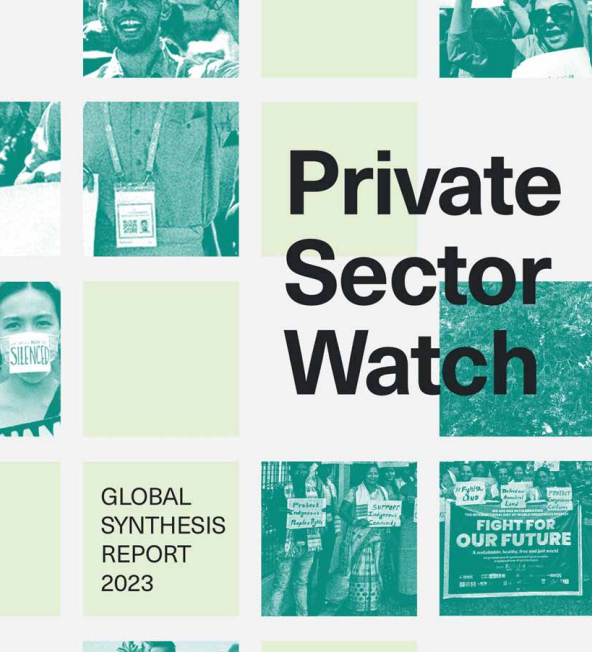Today’s development landscape heavily favours the private sector, oftentimes at the the expense of people and the environment. Amid this state of development finance, the CSO Partnership for Development Effectiveness (CPDE) and The Reality of Aid Network (RoA) sought to examine the increasing role of the private sector in development.
The effort came in the form of the Private Sector Watch, whose Global Synthesis Report 2023 was launched last November 23, and featured nine new case studies from different regions and sectors. Under the PS Watch, CPDE constituencies looked into specific country initiatives where private sector entities are partnering with governments for development, its impact on specific sectors of society, and their compliance with the Kampala Principles. The case studies can also be further explored through the PS Watch Online Hub, an online repository of private sector-led projects across the globe.
During the launch, Tala Batangan from RoA and the CPDE Private Sector Engagement Task Force discussed the key findings from the report, such as the prominence of public-private partnerships and its disproportionate risks to the people, accelerating corporatisation of climate responses. The study also highlighted the imposition of policy conditionalities by international finance institutions leading to further liberalisation of economies, and the overall lack of inclusiveness, transparency and accountability of the private sector.
More positive trends from the report include the increasing role of micro, small, and medium enterprises (MSMEs) and social enterprises (SEs) in positively contributing to economic growth and development, and the potential of the Kampala Principles to guide private sector engagement towards more equitable and sustainable outcomes. In a report released last August, evidence shows the relevance and potential of CSOs and CPDE members in engaging SEs as partners in development cooperation.
Three case studies from the report, featuring different issues and challenges related with private sector-led projects in communities were presented. Isa Dela Cruz from the International Indigenous Peoples Movement for Self-Determination and Liberation (IPMSDL) discussed the struggles of the Cordillera peoples in the Philippines in relation to large-scale hydroelectric projects. Using the Kampala Principles, it was revealed that such projects were centred on commercialization and privatisation of renewable energy, putting Indigenous Peoples at risk of human rights violations, displacement, loss of livelihoods, and environmental destruction. Their study also found that said development projects neglected the implementation of monitoring and accountability mechanisms.
Dejana Stevkovski from Civic Initiatives presented their research on the Safe City Project Solution: Safeguards Serbia. Forwarded by the Serbian government and tech company, Huawei, this project aims to introduce automated policing through smart cameras. The case study reveals that the impacts of the project were difficult to assess due to the lack of transparent channels during project operations. Due to national and international backlash to the project, Civic Initiatives strongly recommends for the government to provide robust oversight, and transparency and accountability mechanisms, as well as to meaningfully engage with civil society throughout the entire process of development projects.
In Ghana, the social enterprise Attarah Ghana, was set up by the Widows and Orphans Movement (WOM) in order to empower widows economically by developing and promoting indigenous agricultural products. Patricia Akakpo from NETRIGHT – Ghana emphasised the positive outcomes of the project using the lens of the Kampala Principles. The case study highlights how the project was able to provide income opportunities for hundreds of women and promote climate-resilient agricultural practices as a way towards environmental sustainability and self-reliance among women.
“The quality of partnerships with the private sector are very critical to reinstate trust”, says Thomas Boehler from the Global Partnership for Effective Development Co-operation (GPEDC) as he echoed the need to assess the quality of private sector engagement. This, he explained, entails making the Kampala Principles the centre of government-private sector partnerships, as well as incorporating meaningful and inclusive dialogues with communities and civil society.
Jeroo Billimoria from Catalyst 2030, on the other hand, reiterated the importance of maximising the potential of SEs to forward effective development, especially at the national level. To ensure that private sector engagement is done right, she also emphasised the need to strictly “monitor them on how they engage with different sectors and with the SDGs.”
In the case studies in this new PS Watch Report, CSOs also continue to forward key recommendations focused on asserting governments to develop effective oversight mechanisms, ensure that businesses contribute to democratically-owned development plans, and pursue pro-people and environment development projects. Meanwhile, the private sector is urged to comply with international standards on labour, gender, environment, and human rights. More importantly, CPDE and RoA argue that inclusive consultations with communities and civil society throughout project timelines must be a priority for all development actors, to uphold people-centred and rights-based development.
Watch the replay of the Private Sector Watch: Global Synthesis Report 2023 Launch in English, Spanish, and French.
You can read the entire Private Sector Watch: Global Synthesis Report 2023 at https://bit.ly/PSWatch-Report-2023 and navigate the PS Watch Online Hub at https://pswatch.csopartnership.org/.

